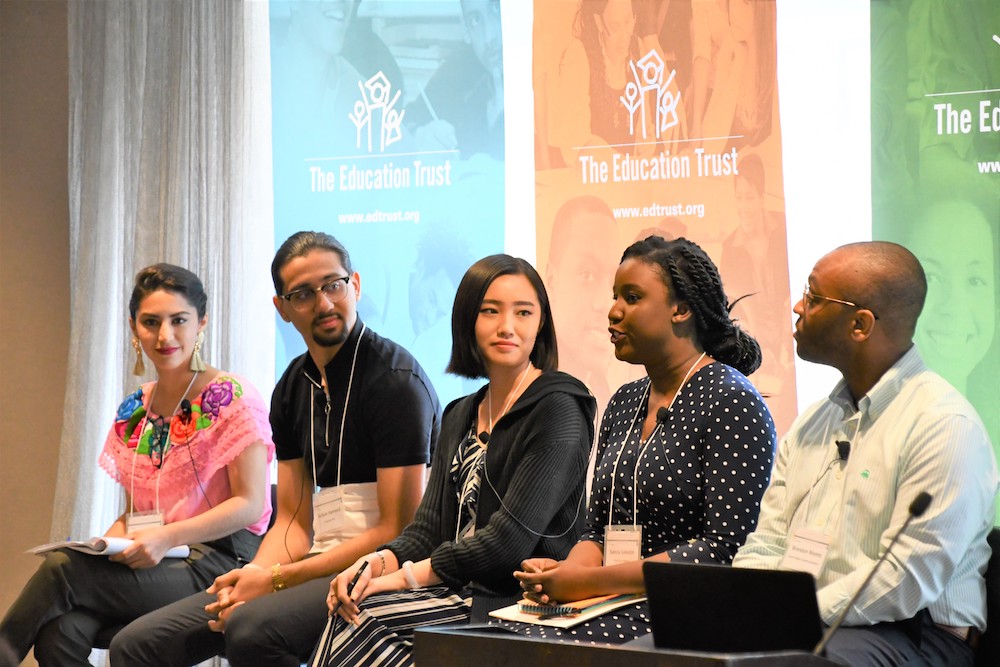Students, researchers, policy makers, and higher education leaders
came together in Washington, DC, Tuesday to discuss what institutions
can do to be better engines of upward mobility for students who are
often left behind in the higher education system.
The event, “Social Mobility, Race, and Higher Education,” was co-hosted by The Education Trust and the TIAA Institute.
Research continues to demonstrate that, while a college degree is
critical for entering the middle class, higher education access and
success remain a challenge often defined along the lines of race,
ethnicity, and income.
Lorelle Espinosa, ACE vice president of research, presented findings from ACE’s Race and Ethnicity in Higher Education
report released earlier this year. She focused on the barriers facing
students of color, particularly Black students, who drop out of college
at higher rates than any other racial or ethnic group. In addition,
Black students are more likely to borrow and accrue higher levels of
debt than other students. Espinosa emphasized the gains students of
color have made in higher education but said those gains should not
overshadow the gaps that still exist.
“If we don’t talk about race and racial equity gaps, then we won’t close those gaps,” she said.
A subsequent student panel gave a personal voice to the numbers.
First-generation and veteran students spoke openly about the
frustrations and barriers they experienced on campus. Lack of awareness
of support for veterans, FAFSA verification, imposter syndrome,
under-borrowing, working to pay rent, and fear of debt were all raised
as issues that complicated their college journey.

Left to right: Student panelists Joseline Garcia, Sufyan Hameed, Grace Pang, Sancia Celestin, and Brandon Nivens
Grace Pang, a sophomore at San Jose State University, said they are
more than statistics and encouraged institutions to engage more with
their students.
“Include students in policymaking, at the institutional and federal
level. Students already have voices. We just need to be empowered to use
them,” she advised.
Many institutions were held up as examples of how to drive social
mobility for these students. Mark P. Becker, president of Georgia State
University, ACE Board chair, and the 2019 TIAA Institute Hesburgh Award
winner, was a featured speaker at the event, as well as the presidents
of Lincoln University in Pennsylvania, Lehman College and Pace
University in New York, and Southwest Tennessee Community College.
The event concluded with a keynote conversation with John B. King
Jr., president and CEO of The Education Trust, and Anthony Jack,
assistant professor of education at Harvard University and author of The Privileged Poor: How Elite Colleges are Failing Disadvantaged Students.
Jack called on institutions and the higher education community to focus
more on the process of graduating students and not solely on outcomes.
“How can we graduate students whole, healthy, and ready for the next
adventure?” he asked.
King and other leaders suggested a couple of ways policy makers and
institutions could take action now, such as offering free and reduced
price lunch programs for college students and working to scale up
programs that are proven to increase student success, such as the City
University of New York ASAP Program and Georgia State’s Perimeter Academy.
Tiffany Jones, director of higher education policy at The Education
Trust, also encouraged attendees to engage with policy makers and ask
them to protect and increase the Pell Grant and to invest in programs
that are enhancing social mobility.
“Relevant congressional committee leadership are currently having
bipartisan talks and hearings in both the House and Senate about the
reauthorization of the Higher Education Act. It is essential that
everyone’s voice in this room be heard as that process goes forward,”
she said.